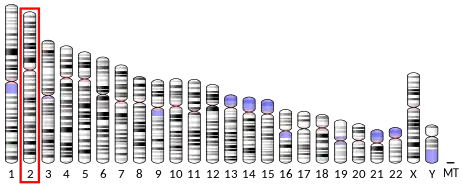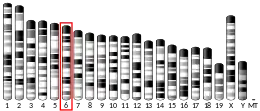KDM3A
Lysine demethylase 3A is a protein that in humans is encoded by the KDM3A gene.[5]
Function
This gene encodes a zinc finger protein that contains a jumonji C (JmjC) domain and may play a role in hormone-dependent transcriptional activation. Alternative splicing results in multiple transcript variants. KDM3A catalyzes the demethylation of H3K9me1 and H3K9me2 residues. Its function is dependent on the presence of cofactors Fe(II) and α-Ketoglutarate.[6]
References
- GRCh38: Ensembl release 89: ENSG00000115548 - Ensembl, May 2017
- GRCm38: Ensembl release 89: ENSMUSG00000053470 - Ensembl, May 2017
- "Human PubMed Reference:". National Center for Biotechnology Information, U.S. National Library of Medicine.
- "Mouse PubMed Reference:". National Center for Biotechnology Information, U.S. National Library of Medicine.
- "Entrez Gene: Lysine demethylase 3A".
- Yamane K, Toumazou C, Tsukada Y, Erdjument-Bromage H, Tempst P, Wong J, Zhang Y (May 2006). "JHDM2A, a JmjC-containing H3K9 demethylase, facilitates transcription activation by androgen receptor". Cell. 125 (3): 483–495. doi:10.1016/j.cell.2006.03.027. PMID 16603237. S2CID 6643329.
Further reading
- Wellmann S, Bettkober M, Zelmer A, Seeger K, Faigle M, Eltzschig HK, Bührer C (August 2008). "Hypoxia upregulates the histone demethylase JMJD1A via HIF-1". Biochemical and Biophysical Research Communications. 372 (4): 892–897. doi:10.1016/j.bbrc.2008.05.150. PMID 18538129.
This article incorporates text from the United States National Library of Medicine, which is in the public domain.
This article is issued from Wikipedia. The text is licensed under Creative Commons - Attribution - Sharealike. Additional terms may apply for the media files.



